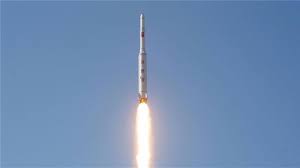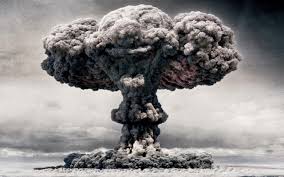 I am writing a series of non-fiction books of 250-300 pages each on Bible prophecy that is accessible to the common reader. My plan is for it to be ten books. The first two are published: Book 1 is The Third Day Bible Code (2006), and Book 2 is Warrior from Heaven (2009). In my next Still Here book, I have a chapter on world disarmament. During the mid-1970s, I became convinced from G. H. Lang’s commentary on the Old Testament book of Daniel (4th ed. 1950; orig. 1940) that the world will disarm itself of not only all weapons of mass de
I am writing a series of non-fiction books of 250-300 pages each on Bible prophecy that is accessible to the common reader. My plan is for it to be ten books. The first two are published: Book 1 is The Third Day Bible Code (2006), and Book 2 is Warrior from Heaven (2009). In my next Still Here book, I have a chapter on world disarmament. During the mid-1970s, I became convinced from G. H. Lang’s commentary on the Old Testament book of Daniel (4th ed. 1950; orig. 1940) that the world will disarm itself of not only all weapons of mass de struction, such as nuclear weapons, but all advanced weapons as well. Henceforth, wars will only be fought with primitive weapons, such as swords, bows and arrows, spears, clubs, etc., just as Ezekiel 38-39 says when interpreted literally, as Land (and I) believed it should be.
struction, such as nuclear weapons, but all advanced weapons as well. Henceforth, wars will only be fought with primitive weapons, such as swords, bows and arrows, spears, clubs, etc., just as Ezekiel 38-39 says when interpreted literally, as Land (and I) believed it should be.
I have occasionally posted about this subject on this blog. The USSR/Russia and U.S. have conducted nuclear disarmament negotiations for several decades that achieved several agreements between them. The result has been that during the 1970s, both sides had something like about 50,000 nuclear weapons, and now each side has about 1,700 nuclear weapons. However, there are about 17 nations that have nuclear weapons of their own. Most are members of the Nuclear Non-proliferation Treaty. The danger with small, resource-deficient, financially poor, North Korea is that it is such an isolationist, rogue, militaristic state governed by a dictator that is a threat to the U.S.
 So, if I am right about Bible prophecy indicating the world will return to primitive weapons only, I think the most logical scenario in which that will happen is that there will be nuclear war or wars in the future that will result in such devastation to this planet and loss of human life that the world will decide to get rid of all such weapons. However, worse weapons than that are on the drawing boards of some nations. Space warfare is a possibility in the future that could be quite lethal.
So, if I am right about Bible prophecy indicating the world will return to primitive weapons only, I think the most logical scenario in which that will happen is that there will be nuclear war or wars in the future that will result in such devastation to this planet and loss of human life that the world will decide to get rid of all such weapons. However, worse weapons than that are on the drawing boards of some nations. Space warfare is a possibility in the future that could be quite lethal.
 I also have mentioned on this blog that I like to read articles by Robert Robb, editorial columnist for The Arizona Republic newspaper since I live here in metro-Phoenix. His Friday column was entitled S. Korea, Japan should go nuclear.” That is a very sobering, if not frightening, prospect that Donald Trump actually stated as his viewpoint during his presidential campaign last year. I hope it doesn’t happen, but it may be inevitable. North Korea is technically still at war with South Korean and its ally the USA. The Korean War of 1950-1953 only ended with an armistice. Ever since, the U.S. has had 30,000-40,000 of its own troops on the DMZ (demilitarized zone) that represents the border between South and North Korea. With Kim John-un now in power, North Korea continues its belligerency toward especially the USA.
I also have mentioned on this blog that I like to read articles by Robert Robb, editorial columnist for The Arizona Republic newspaper since I live here in metro-Phoenix. His Friday column was entitled S. Korea, Japan should go nuclear.” That is a very sobering, if not frightening, prospect that Donald Trump actually stated as his viewpoint during his presidential campaign last year. I hope it doesn’t happen, but it may be inevitable. North Korea is technically still at war with South Korean and its ally the USA. The Korean War of 1950-1953 only ended with an armistice. Ever since, the U.S. has had 30,000-40,000 of its own troops on the DMZ (demilitarized zone) that represents the border between South and North Korea. With Kim John-un now in power, North Korea continues its belligerency toward especially the USA.
This week, for the first time North Korea tested a miniaturized hydrogen bomb that supposedly can fit on an ICBM. In the past few weeks, for the first time they have flown ICBMs that have exited earth’s atmosphere into space, traveled through space for some distance, then re-entered earth’s atmosphere, and splashed in the Pacific Ocean. So, North Korea may now have the capability of launching a nuclear-tipped ICBM that can reach the U.S. Our experts had been forecasting that North Korea would not be able to achieve this milestone for at least two or more years. But they have been proved wrong.
This is a frightening situation for us Americans. In the past few weeks, President Donald Trump and his Secretary of Defense John Mattis have made threatening remarks to North Korea, insinuating that any missile provocation by North Korea launched at the U.S. would be met with devastating results for that nation. On August 7, President Trump said publicly, “North Korea best not make any more threats to the United States. They will be met with fire and fury like the world has never seen.” That only refers to threats, thus not even an attack. Americans have been discussing ever since whether or not it has been wise for our leaders to ramp up the rhetoric like this.
Cooler heads are calling for less military rhetoric and more talk about negotiation. But Trump is right, that the U.S. has gone that route for decades with North Korea’s efforts to develop nuclear weapons, and it hasn’t produced any positive results. Here is what Robert Robb has to say about the matter in his column this week:
“During the [presidential] campaign, Donald Trump speculated that perhaps South Korea and Japan should acquire their own nuclear weapons. This was roundly condemned by virtually everyone from every side. I did’t join the condemnation for a compelling reason: I’d been speculation about the very same thing for several years.
“Given North Korea’s development of the capability of reaching the United States with a missile, and its increasingly aggressive behavior in the region, it’s time to move this idea from the supposed kook ward and start fairly evaluating it, rather than cavalierly dismissing it.
“Even before the recent developments, it made no sense for the United States to assume responsibility for protecting South Korea and Japan against North Korea.
“South Korea has a population twice as big as North Korea’s and an economy 50 times larger. Japan has five times as many people and an economy that is 125 times larger.
“South Korea spends five times as much on its military as does North Korea. Japan spends even more.
“GDP per capita in South Korea is $37,900. In Japan, it’s $38,900. In North Korea, it’s just $1,700. South Korea and Japan have far greater capability of increasing their military prowess than does North Korea, which is already more than maxed out. North Korea can’t win an arms race with either country.
“In short, North Korea doesn’t pose, or shouldn’t pose, any conventional threat to South Korea or Japan. It only poses a threat because it has nuclear weapons and South Korea and Japan do not.
“Supposedly, the U.S. nuclear umbrella neutralizes this North Korean advantage. But it clearly does not, or North Korea wouldn’t be engaged in such reckless aggression in the region.
“To the extent there is a strategic purpose to North Korea’s saber-rattling, it is thought to be, in part, an attempt to drive a wedge between the United States and South Korea and Japan. If that is the purpose, it has succeeded.
“Once North Korea developed the capability of reaching the United States with a missile, it created a divergence of interest between the United States, on the one hand, and South Korea and Japan on the other.
“If North Korea can retaliate with a nuclear strike against the United States, the United States is going to be less willing to go all-out to protect South Korea and Japan. That is the reality, irrespective of how many times presidents, secretaries of State and American military brass vow otherwise.
“The United States should be undertaking a crash program to develop a boost-phase missile-defense capability. That might truly neutralize the North Korean nuclear threat.
“But at present, that’s an uncertain prospect. It’s not a proven alternative to South Korea and Japan having their own nuclear umbrellas.
“Both countries are thought capable of developing nuclear weapons quickly, within a year or two. The idea has some traction in South Korea but not at present in Japan, where the post-World War II pacifist ethos remains strong. South Korea and Japan having nuclear weapons would obviously change the balance of power regarding North Korea. North Korea would be highly unlikely to fire a missile over a nuclear-armed Japan. A nuclear-armed Japan would be less likely to take such a provocation passively.
“China would go crazy. But a realistic prospect of a nuclear-armed South Korea and Japan might get China to effectuate a coup in North Korea that would substitute a regime friendly to China but not a threat to others.
“China seems to want to achieve a hegemony of sorts in the region. South Korea and particularly Japan want the United States to be a counterbalance. That’s not a long-term solution. A nuclear-armed Japan and South Korea would have far less to fear from Chinese incursions.
“Nuclear non-proliferation has only restrained the good guys. The British have roughly 200 nuclear weapons; the French have 300. They don’t keep us up at night. Neither would a nuclear-armed South Korea or Japan.
“Pax Americana, in which the United States provides security guarantees throughout the world, can’t last forever. We’re less than 5 percent of the world’s population. The United States should be in the business of encouraging other industrial democracies to provide for their own security.”













